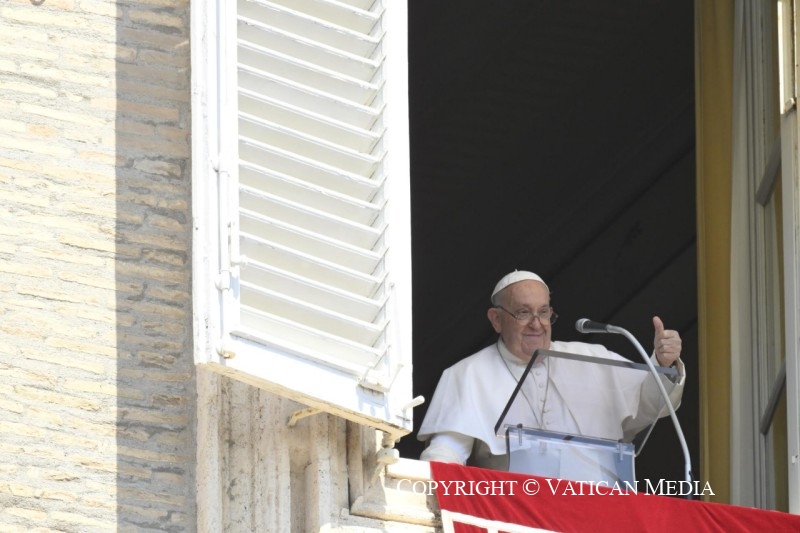Dear brothers and sisters, happy Sunday!
Today the Gospel of the liturgy (Jn 6:41-51) tells us about the reaction of the Judeans to the statement of Jesus, who says: “I have come down from heaven” (Jn 6:38). They are scandalized.
They murmur among themselves: “Is not this Jesus, the son of Joseph, whose father and mother we know? How does he now say, ‘I have come down from heaven’?” (Jn 6:42). And they murmur like this. Let us pay attention to what they say. They are convinced that Jesus cannot have come from heaven, because he is the son of a carpenter and because his mother and his relatives are common people, familiar, normal people, like so many others. “How could God manifest Himself in such an ordinary way?”, they say. They are obstructed in their faith by their preconception of his humble origins and they are obstructed by the presumption, therefore, that they have nothing to learn from him. Preconceptions and presumptions, how much harm they do! They prevent sincere dialogue, a coming together of brothers and sisters: beware of preconceptions and presumptions. They have their rigid mindsets, and there is no space in their heart for what does not fit into them, for what they are unable to catalogue and file away in the dusty shelves of their security. And this is true: very often our securities are closed up, dusty, like old books.
And yet they are people who observe the law, who give alms, who respect fasts and times of prayer. Indeed, Christ has already performed various miracles (cf. Jn 2:1-11,4,43-54; 5:1-9; 6:1-25). How is it that all this does not help them to recognize in Him the Messiah? Why does it not help them? Because they carry out their religious practices not so much in order to listen to the Lord, but rather to find in them the confirmation of what they think. They are closed to the Word of the Lord, and look for confirmation of their own thoughts. This is demonstrated by the fact that they do not even take the trouble to ask Jesus for an explanation; they limit themselves to murmuring among themselves against Him (cf. Jn 6:41), as though to reassure each other of what they are convinced, and they shut themselves in, they are closed up in an impenetrable fortress. And so, they are unable to believe. The closure of the heart: how much harm it does, how much harm!

Let us pay attention to all of this, because at times the same thing can happen to us too, in our life and in our prayer: it can happen to us, that is, that instead of truly listening to what the Lord has to say to us, we look to Him and others only for a confirmation of what we think, a confirmation of our convictions, our judgements, which are prejudices. But this way of addressing God does not help us to encounter God, to truly encounter Him, nor to open ourselves up to the gift of His light and His grace, in order to grow in goodness, to do His will and to overcome failings and difficulties. Brothers and sisters, faith and prayer, when they are true, open the mind and the heart; they do not close them. When you find a person who is closed in their mind, in prayer, that faith and that prayer are not true.
Let us ask ourselves, then: in my life of faith, am I capable of being truly silent within myself, and listening to God? Am I willing to welcome His voice, beyond my own mindset, and also, with His help, to overcome my fears?
May Mary help us to listen with faith to the Lord’s voice, and to do His will courageously.
After the Angelus
Dear brothers and sisters!
We have commemorated, in these days, the anniversary of the atomic bombing of the cities of Hiroshima and Nagasaki. As we continue to commend to the Lord the victims of those events, and of all wars, let us renew our intense prayer for peace, especially for troubled Ukraine, the Middle East, Palestine, Israel, Sudan and Myanmar.
Today is the feast of Saint Clare: I address an affectionate thought to all the Clarissians, and in particular those of Vallegloria, with whom I have a beautiful friendship.
Let us also pray for the victims of the tragic air crash in Brazil.
And I greet you all, Romans and pilgrims from Italy and many countries, in particular the group of students from the minor seminary of Bergamo, who have come on foot from Assisi, in a several days-long pilgrimage. Are you tired? No? Good. You are good!
I wish you all a happy Sunday. And to you, too young people of the Immacolata: happy Sunday! And please, do not forget to pray for me; you Brazilians, too, who I can see clearly. To all of you, thank you! Enjoy your lunch, and arrivederci!
Source: vatican.va





